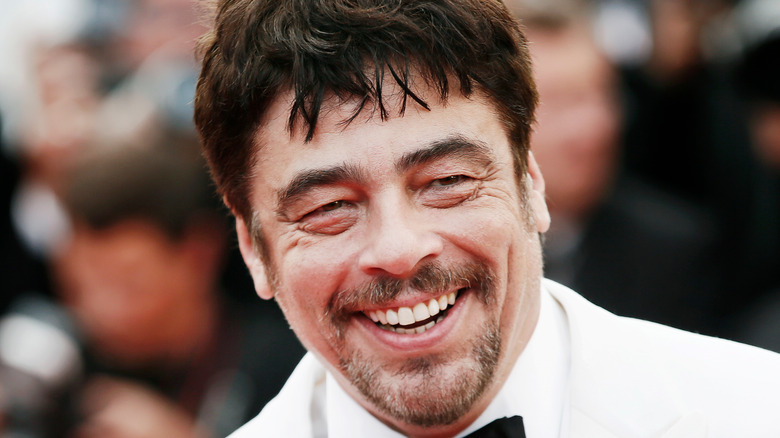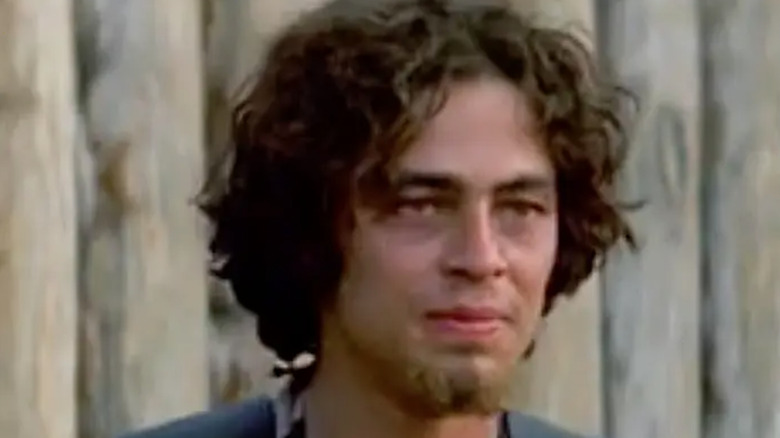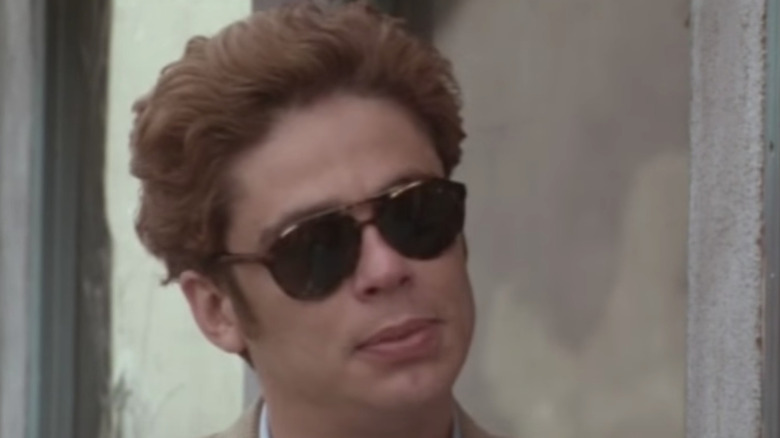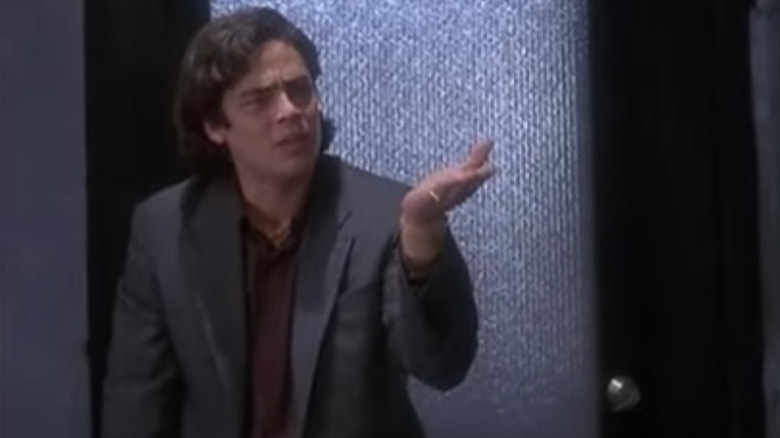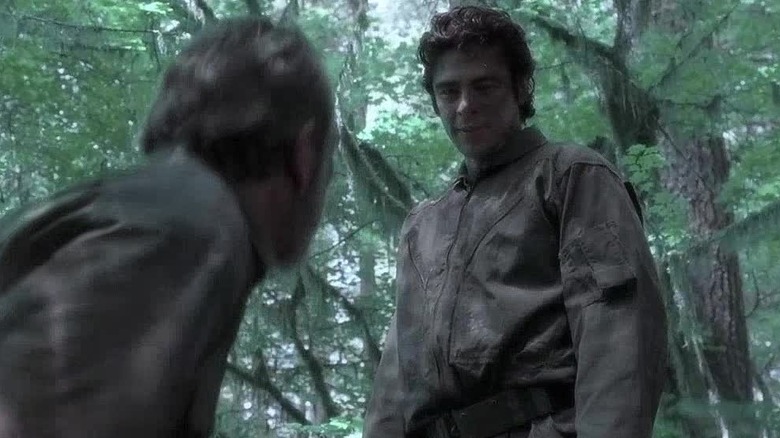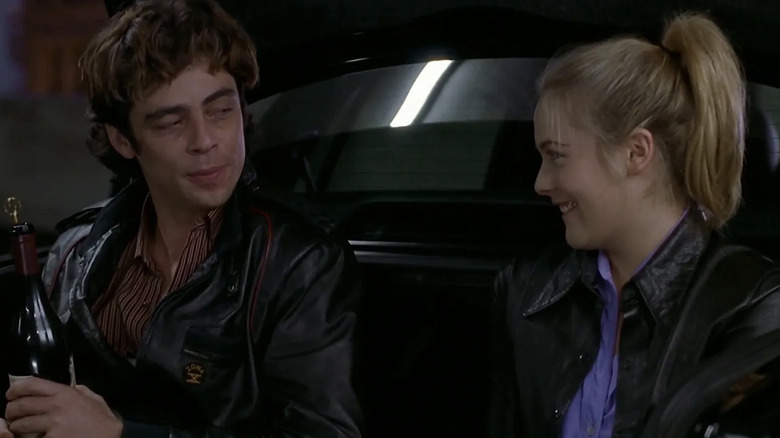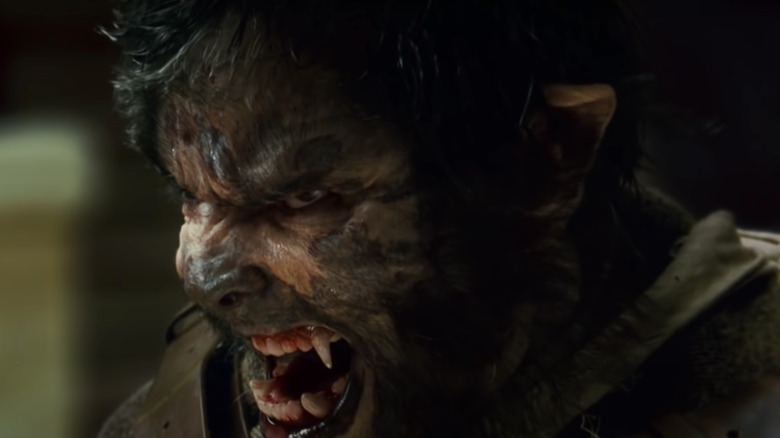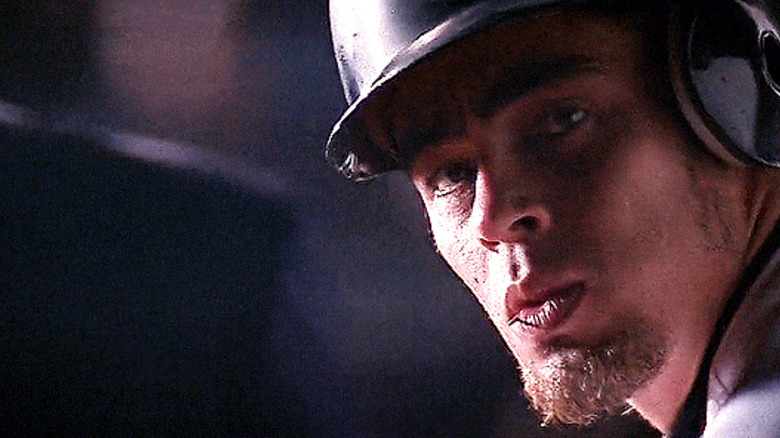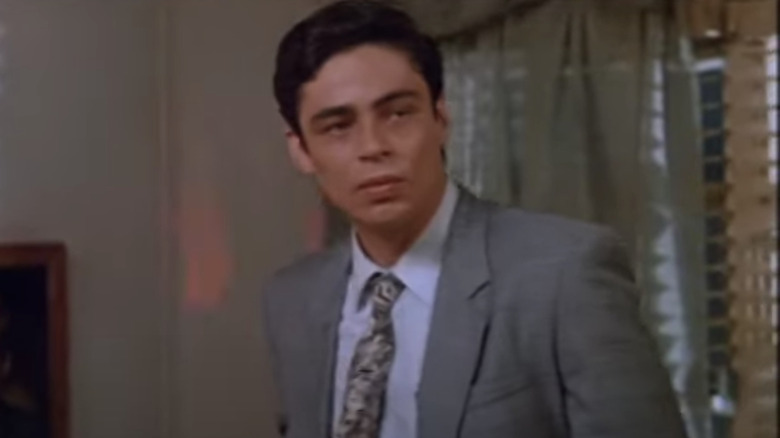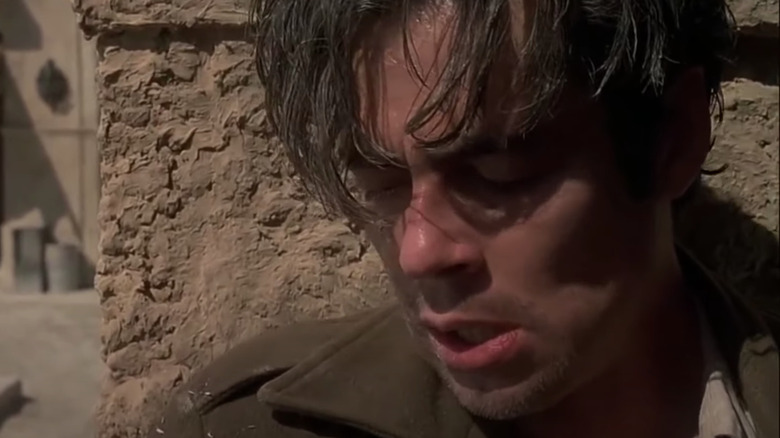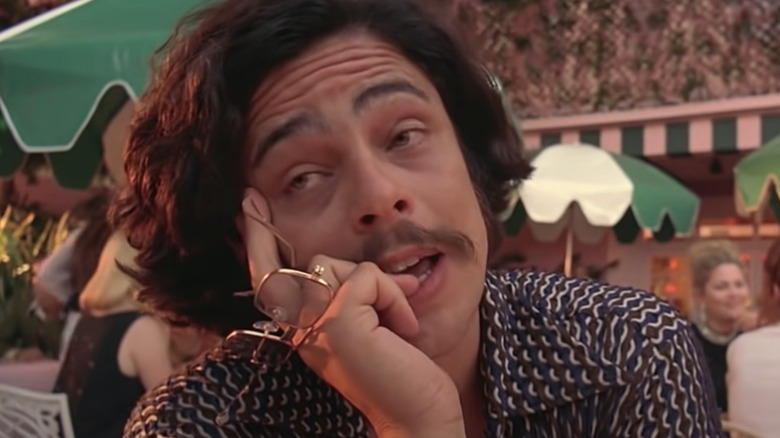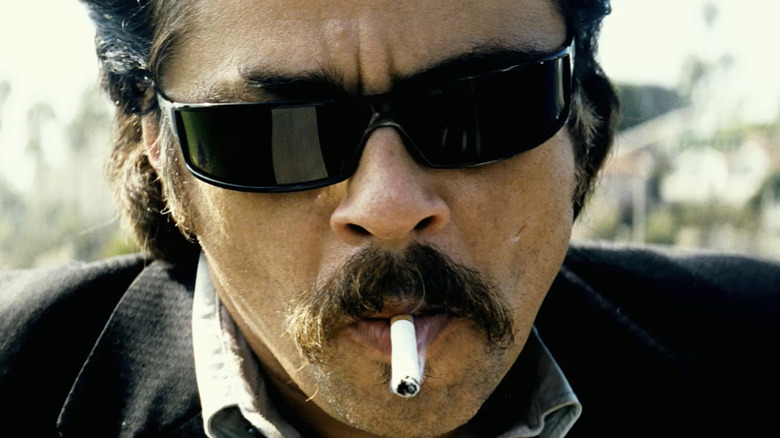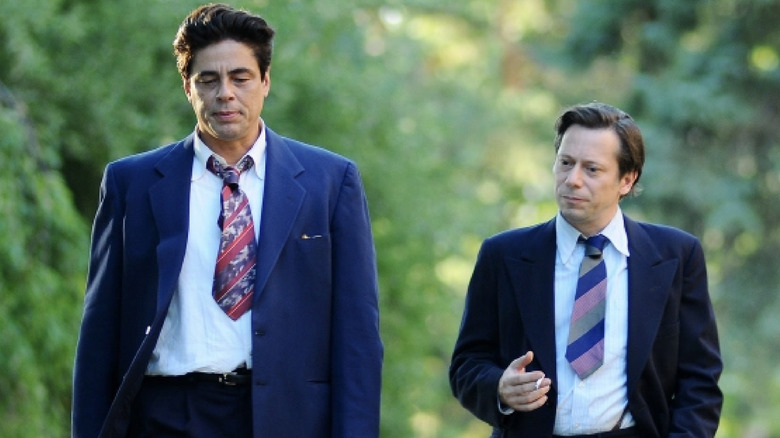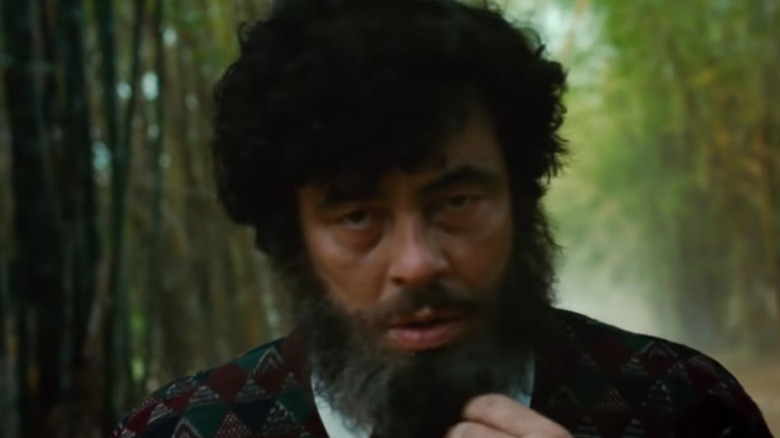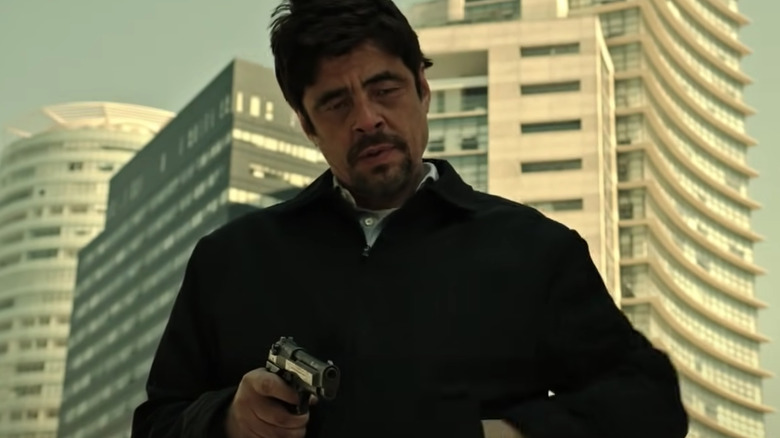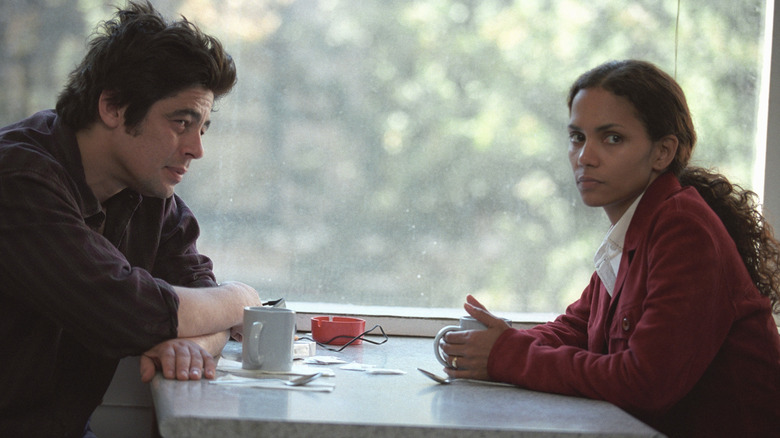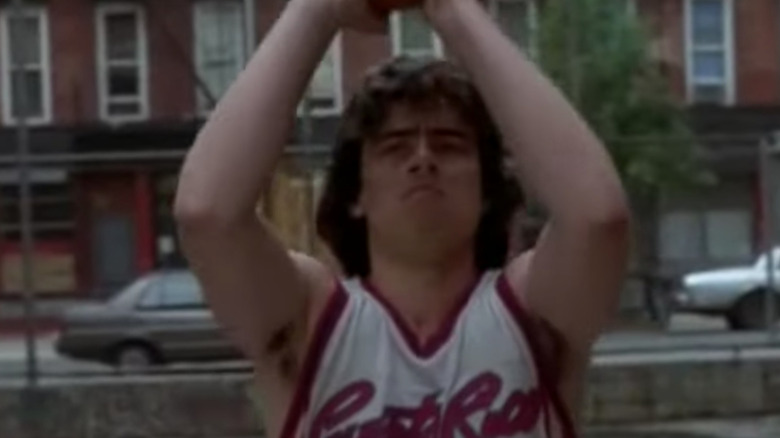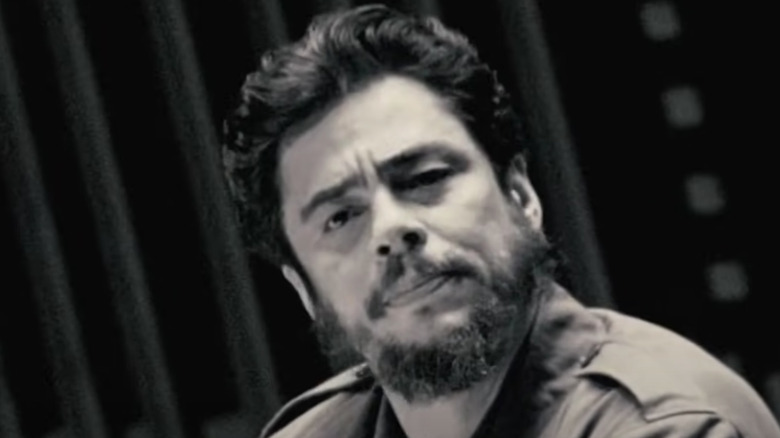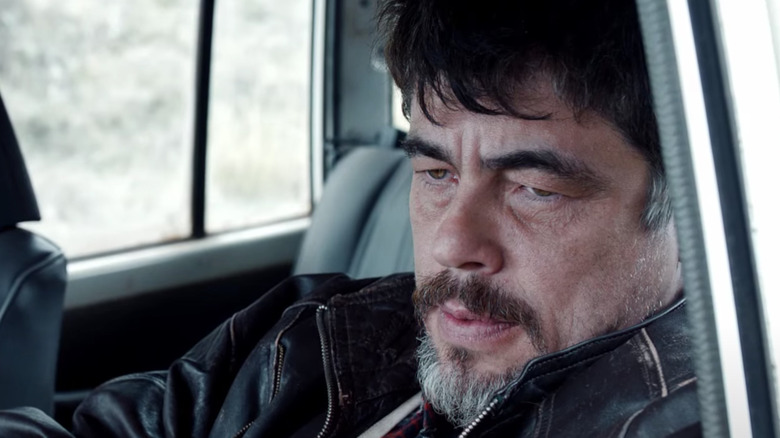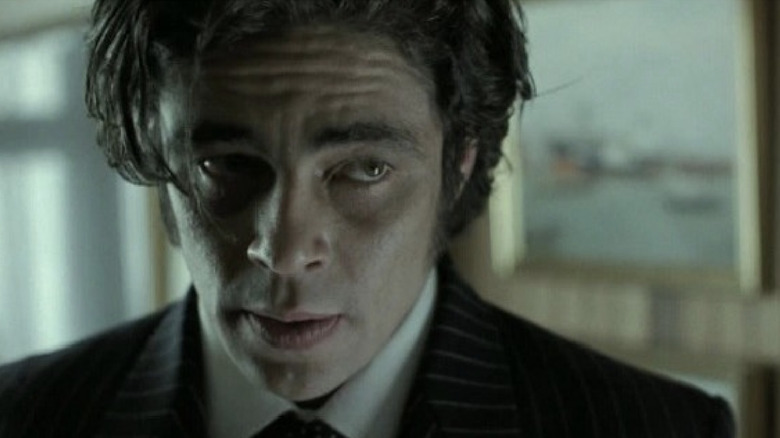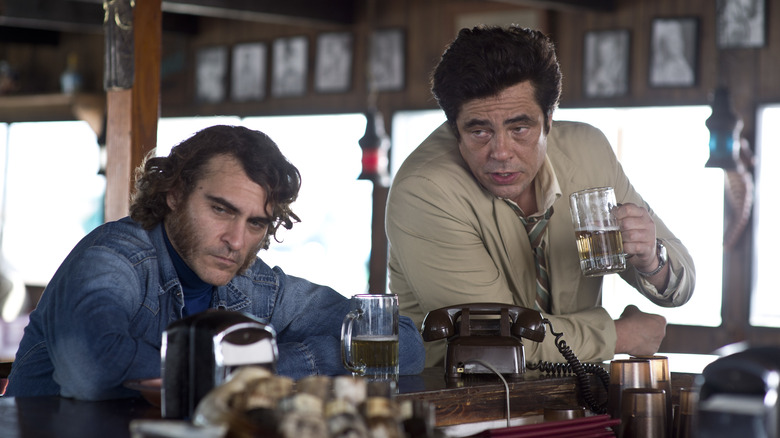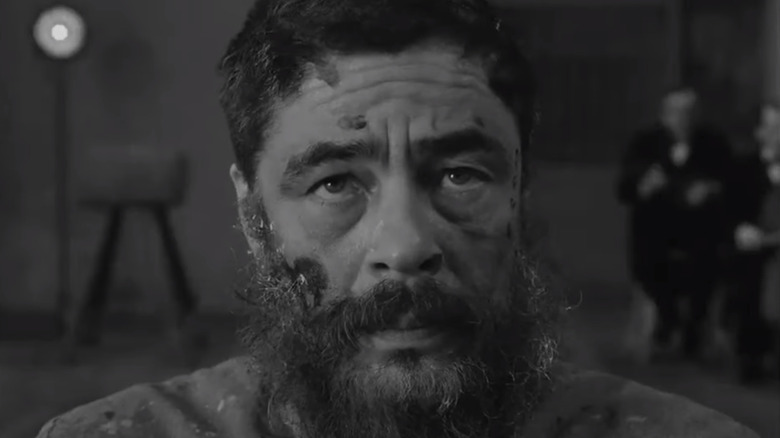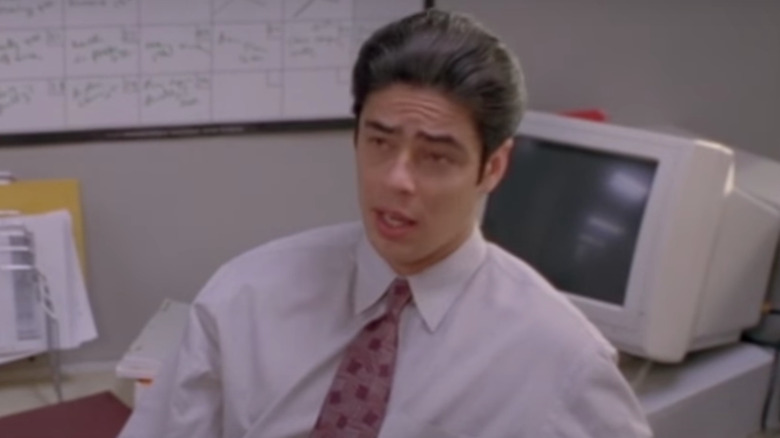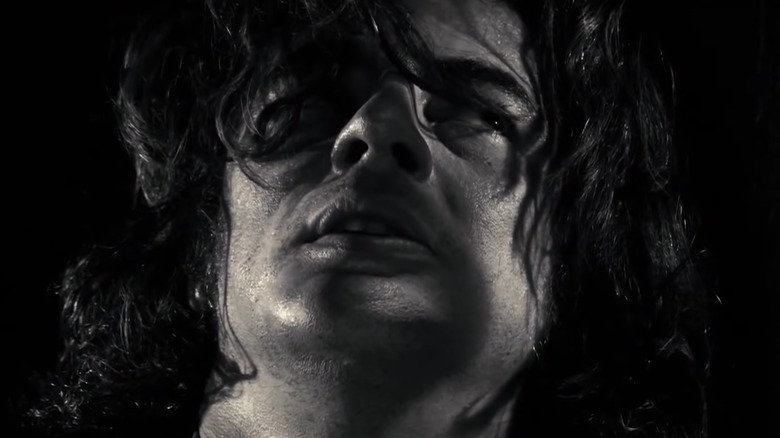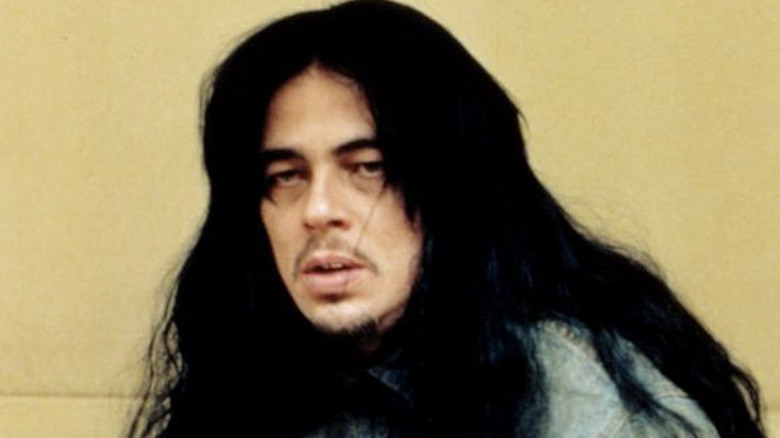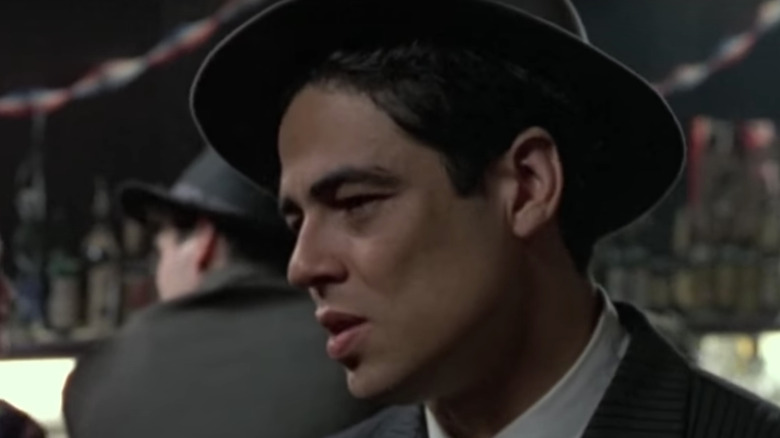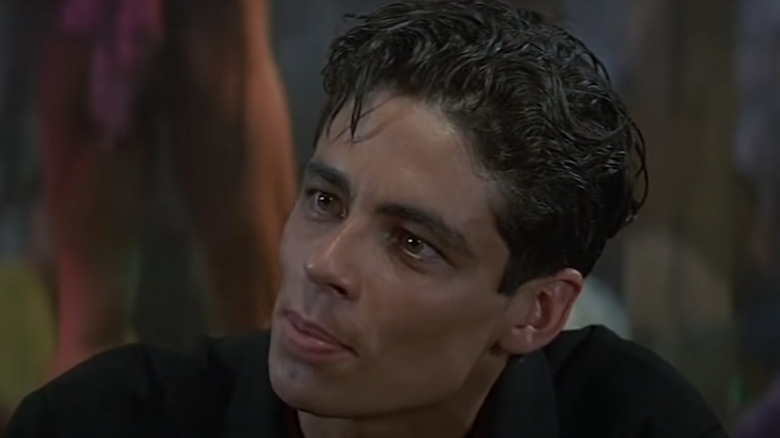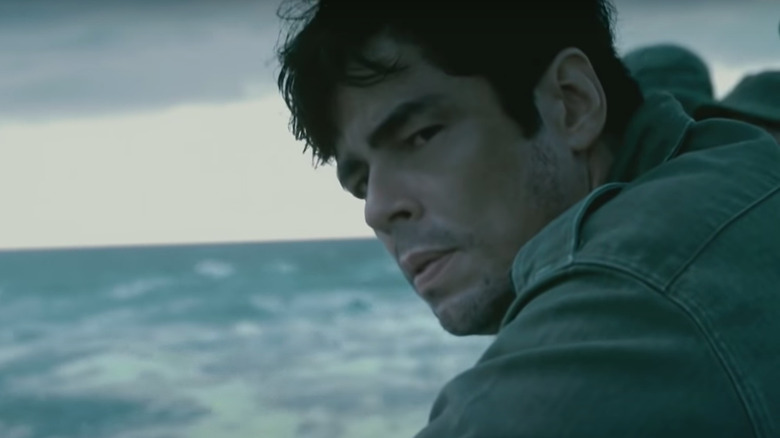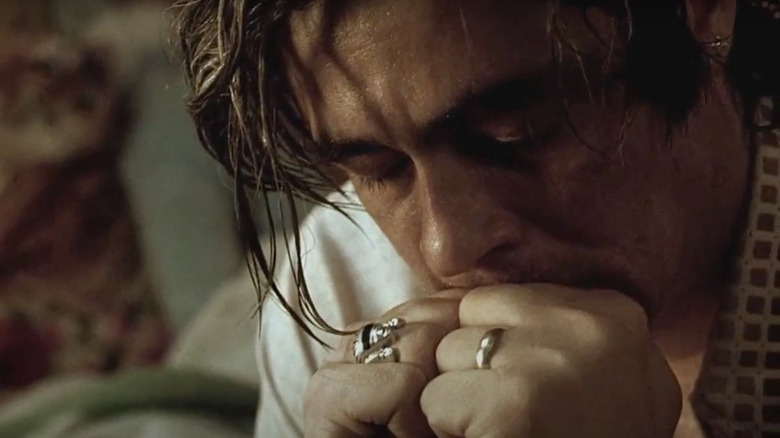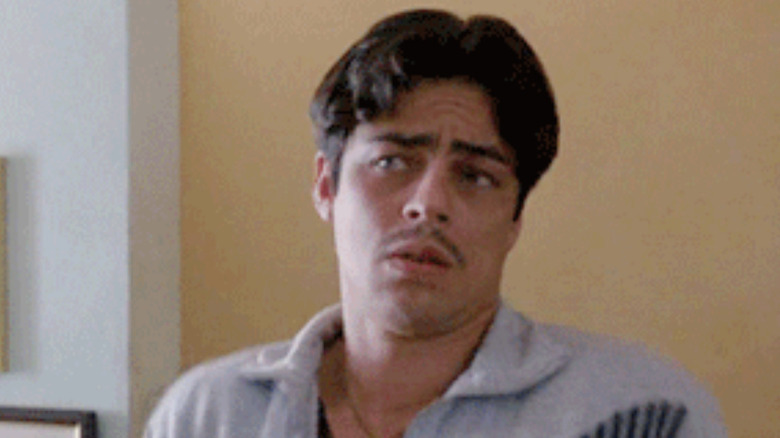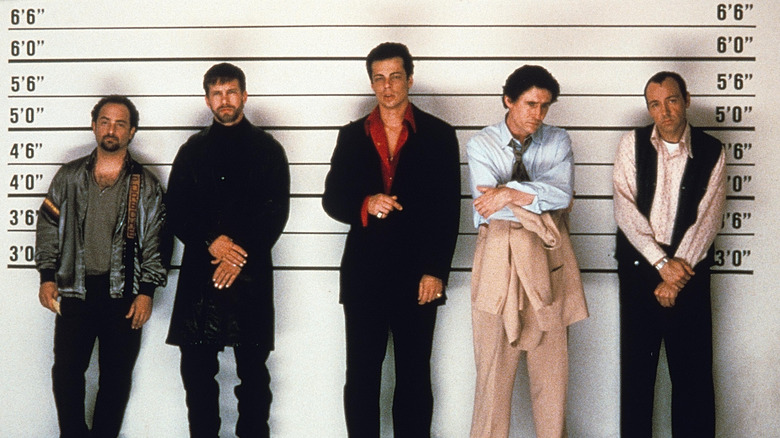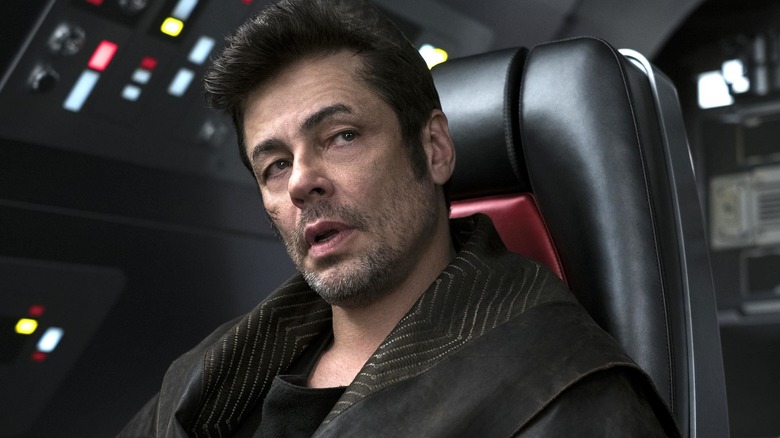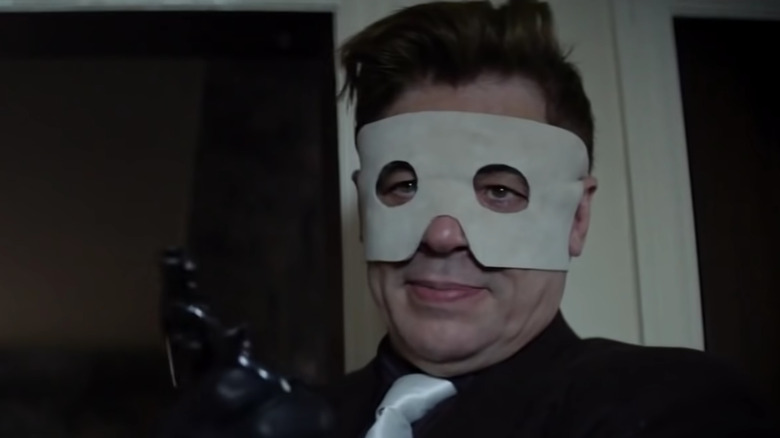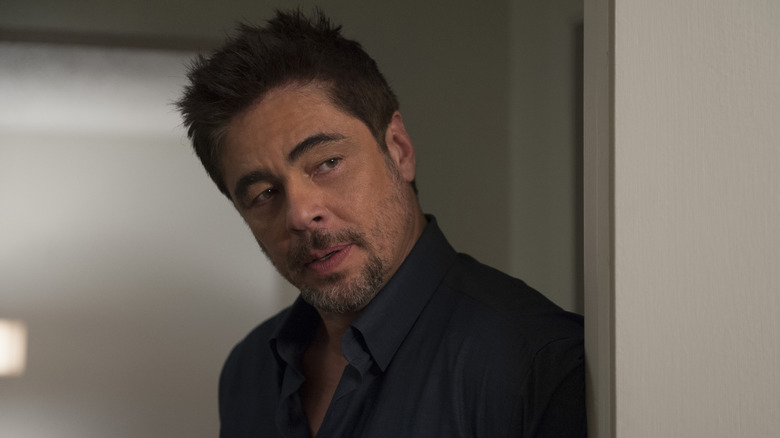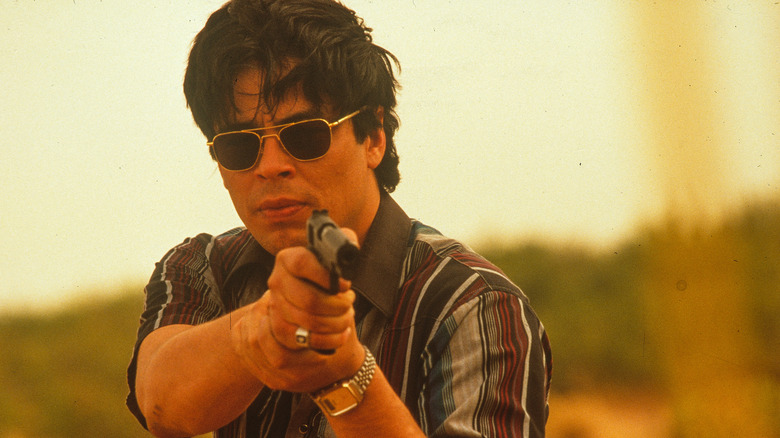Every Benicio Del Toro Movie Ranked From Worst To Best
With dozens of complex characters and Oscar and BAFTA wins to his name, Benicio Del Toro has established himself as one of the most talented actors of his generation. After rising up the ranks by stealing scenes and standing out while playing small side characters, Del Toro eventually made a name for himself and began landing bigger and better parts. These days, whether he's cast in the starring role or as a complex supporting character, Del Toro seemingly never fails to leave a lasting impression.
Below, all of Del Toro's significant roles, from minor to major. Cameos — such as his brief appearances in the Marvel Cinematic Universe as The Collector — are excluded from the ranking, as are vocal performances in animated films. With that in mind, here's a countdown of Benicio Del Toro's movies from best to worst, based on their aggregated critic scores on Rotten Tomatoes.
34. Christopher Columbus: The Discovery (1992)
The lowest rated movie of Benicio Del Toro's entire acting career is "Christopher Columbus: The Discovery." As you might guess from the title, this movie is a historical biopic about the discovery of America by the famed explorer Christopher Columbus. After being met with universal disdain from critics and general audiences alike on Rotten Tomatoes, "Christopher Columbus: The Discovery" has largely been forgotten about altogether in the years since its release in 1992 as a misguided attempt to turn Columbus into a swashbuckling Robin Hood-esque figure.
Christopher Columbus himself was played by Georges Corraface, while Del Toro played the supporting role of Alvaro Harana, a fictional character created for the film. Other recognizable names on the cast include Catherine Zeta-Jones, Robert Davi, Tom Selleck, Rachel Ward, and Marlon Brando in one of his final feature film roles. Critics found little to like about the movie. Peter Rainer of the Los Angeles Times was especially harsh in his review, writing "It's not politically correct. It's also not cinematically correct, humanly correct or historically correct."
33. Joyride (1997)
"Joyride" is a crime drama from 1997, not to be confused with the 1977 crime comedy "Joyride," the 2022 drama "Joyride," or the 2001 thriller "Joy Ride." This particular "Joyride" stars Tobey Maguire as a bored teenager who decides to steal a convertible in the hopes of impressing a woman he has a crush on, played by Amy Hathaway. This causes more trouble than expected when it turns out that the convertible's owner is a professional hit-woman, played by Christina Naify. Benicio Del Toro plays the detective who gets assigned to the case and caught up in the middle of things.
This critical failure was the directorial debut of writer/director Quinton Peeples. Though his directing career never took off (possibly with the poor reception of "Joyride" to blame), Peeples went on to lead a successful career as a television writer and producer, getting involved in shows like "13 Reasons Why," "11.22.63," and "Iron Fist." 1997 wasn't the best year for Benicio Del Toro's acting career, with his only other major role that year taking place in the poorly-received "Excess Baggage."
32. Money for Nothing (1993)
Depicting the true story of a man who stumbled upon $1.2 million on the side of the road after it fell off the back of an armored bank truck, this John Cusack vehicle was adapted from an article ("Finders Keepers: The Story of Joey Coyle" by Mark Bowden) and had Cusack supported by the impressive likes of Del Toro, James Gandolfini, Michael Madsen, Debi Mazar, Frankie Faison, Philip Seymour Hoffman, Maury Chaykin, and Michael Rapaport.
Del Toro plays a mob-adjacent money launderer named Dino. Despite a strong cast and an interesting true-story premise, "Money for Nothing" didn't received the warmest reception.
"[Director] Ramon Menendez fails to sell the wildly implausible set-up," read one review. "Sure, we know these events are based on a true story ... but the atmosphere and camerawork make this sequence seem artificial and impossible ... the problem here is that Menendez keeps steering this story into slapstick, when it's really quite tragic."
Given that Cusack's character is a depressed meth-addict with a dead father and a sick, bedridden mother, Menéndez's comedically-inclined directorial choices sometimes displayed a fundamental misreading of the tone. Despite having directed the much better-received "Stand and Deliver" five years earlier, "Money for Nothing" would be Menéndez's second and final feature film.
31. The Hunted (2003)
It may have been released when Del Toro was arguably at the peak of his powers as a box-office draw, and been directed by the legendary William Friedkin — director of classic movies like "The Exorcist," "Sorcerer" and "The French Connection" — but this mano-a-mano drama sounded better on paper than in practice. The film cast Tommy Lee Jones and Del Toro as former allies turned deadly rivals, but instead of telling its intended snarling tale of survival, it got lost in the woods.
Where "The Hunted" falls apart is primarily in the script, though a few of Friedkin's directorial choices may have missed the mark as well. The story is a familiar cat-and-mouse thriller with Tommy Lee Jones's character determined to track down and stop Del Toro's character, a military-trained assassin who went rogue after having a stressed-induced breakdown. It's essentially "First Blood," if Richard Crenna had been more hands-on.
The only area where the film may impress to any degree is in the knife-fighting sequences, executed with high realism and making use of the seldom-seen Kali Eskrima fighting style, also known colloquially as Filipino knife fighting. Roger Ebert was one critic impressed by the attention to detail, giving "The Hunted" a 3.5/4-star review and calling it "a pure and rather inspired example of the one-on-one chase movie," comparing it kindly to the earlier Tommy Lee Jones movie "The Fugitive."
30. Excess Baggage (1997)
Coming off "Clueless" and suddenly one of the most in-demand stars in Hollywood, 18-year-old Alicia Silverstone signed a production deal with Columbia Pictures that sent shockwaves through Hollywood at the time. The $8-million deal made Silverstone one of the most highly-paid actresses in Hollywood ... but the only movie that came of it was this poorly-received vehicle, supposedly marred by such a fractured creative partnership between Silverstone and director Marco Brambilla that one star had an idling limo on standby so he could "flee" the set.
Silverstone plays an heiress in the film, who attempts to gain attention from her neglectful father by faking her own kidnapping. Hiding in her car trunk, Del Toro's character Vincent steals the car, leading to a wild chase supported by the likes of Jack Thompson, Christopher Walken, and Harry Connick Jr.
Director Brambilla never made another feature film, a producer quit the shoot partway through, and the script was constantly being re-written throughout the entire production with several writers rotating through, reportedly including big-name screenwriters like Scott Alexander & Larry Karaszewski, Aaron Sorkin and Mark Haskell Smith. The movie was delayed for an entire year after negative test screenings led to reshoots, but they didn't help much, and by the time Silverstone's producing debut arrived in theaters, audiences simply weren't interested in all that "Baggage."
29. The Wolfman (2010)
A big-budget remake/reboot of a classic monster story, this Joe Johnston film cast Del Toro in a role he seemed born to play. The actor also served as one of the film's producers — unfortunate since "The Wolfman" was a bomb, making back only around $60 million of its $150 million budget at the domestic box office, doing only slightly better overseas.
Since the original Universal "The Wolfman" back in 1941, there have been countless lycanthrope-based wannabes; 2010's "The Wolfman" felt like a tired greatest hits collection of other, better werewolf movies that came before it.
The movie was particularly hampered by weak CGI, odd since it was marketed as a Rick Baker-fueled return to old-school filmmaking. "When the beast finally bursts forth," wrote one critic, "the character becomes, for the most part, a digitally augmented blur — there's no room for a performance underneath all the 0s and 1s."
28. The Fan (1996)
A vehicle for Robert De Niro and Wesley Snipes marketed largely as a clash between the two stars, Del Toro, John Leguizamo and others were collateral damage in this intense baseball film.
Directed by Tony Scott ("True Romance," "The Last Boy Scout") in his '90s sweat-and-closeups signature style, De Niro plays a troubled knife salesman who forms a dangerous obsession over the newest player on his favorite baseball team, the San Francisco Giants. Snipes and Del Toro are both players on the team.
Del Toro plays deliciously-named Giants hotshot Juan Primo, who clashes with Snipes' Bobby Rayburn over, of all things, who gets to wear uniform number 11. De Niro's Gil Gerard, believing himself to be a sort of guardian angel for Rayburn (and evoking similarities to his beloved "The King of Comedy" stalker), confronts Primo in a sauna for a grisly scene that leaves the ball player on the permanent IL.
Aside from being one of Del Toro's lowest-rated movies, "The Fan" is also among Scott's lowest, with Rotten Tomatoes critics pointing to an over-the-top ending as one of the film's missteps.
"A roughly-assembled, mean movie," said one review. "Flashes of solid genre filmmaking keep it from being a wash, but it's really not much fun at all."
In addition to being a critical flop, "The Fan" was a financial disappointment as well. The movie brought in just $18 million at the box office, a mere fraction of its $55 million budget.
27. China Moon (1994)
A mystery thriller starring Ed Harris, timed to capitalize on the same mid-'90s film noir renaissance that made hits out of "Red Rock West" and "The Last Seduction," this film wasn't written or directed by John Dahl, and unfortunately wasn't as good as either of his films.
Harris plays a detective who begins an affair with a married woman (played by Madeleine Stowe); after she kills her husband (Charles Dance), Harris helps her hide the body and cover up the crime. Del Toro is the cop's detective on the homicide unit, who suspects his partner may be responsible.
The movie was directed by John Bailey, and it was the only big-budget, mainstream movie of his directorial career. Bailey is best known as a cinematographer, having shot dozens of acclaimed movies such as "The Big Chill," "Groundhog Day," and "As Good as It Gets." Though Bailey is a talented cinematographer, critics and audiences alike seemed to take issue with his directing chops on "China Moon."
26. The Way of the Gun (2000)
Something of a forgotten classic, Christopher McQuarrie's "The Way of the Gun" is a divisive entry in Del Toro's filmography. General audiences enjoyed the flick and it currently resides at a fresh score some two decades after its lackluster box office reception; critics, however, weren't fond of its violence upon release and it remains bogged down by a score nearly 30 points lower on Rotten Tomatoes.
The film pairs Del Toro and Ryan Phillippe as a pair of ruthless criminals of opportunity who kidnap a pregnant woman (Juliette Lewis) for ransom. This sets off a chain of events that has them on the run from Taye Diggs and Nicky Katt, as well as a team of older mercenaries led by James Caan.
One of oh-so-many Quentin Tarantino-esque crime films released in the wake of his '90s rise to fame, some critics were displeased by the film's characters and tone.
"The Way of the Gun is doomy trash, a blood-soaked saga of remorseless killers and natural-born blatherers," wrote one reviewer. "I'm sure I've seen worse movies, but nothing so steadfastly unpleasant comes to mind."
Cleverly enough, McQuarrie's post-"Usual Suspects" script casts Phillippe and Del Toro as Parker and Longbaugh, alluding to the real names of Butch Cassidy and the Sundance Kid, and the location of the final shootout was the same used for the finale of the Paul Newman/Robert Redford classic. As much a Western as it is a contemporary crime-thriller, don't feel bad for McQuarrie — after this directorial debut bombed, he went on become a driving force in the "Mission Impossible" film franchise, directing four films in the series.
25. Fear and Loathing in Las Vegas (!998)
It might come as something of a surprise that Terry Gilliam's "Fear and Loathing in Las Vegas" adaptation has a rotten critic score on Rotten Tomatoes, given how frequently the movie is spoken of with reverence and how firmly implanted in the cultural zeitgeist it has remained. Displaying a massive gulf between critics (about 49%) and general audiences (about 90%), it does seem somewhat appropriate, however, that this trippy Hunter S. Thompson movie is all about perception.
Gilliam employed wild camerawork and an unrestrained visual style for this film about a Thompson-esque stand-in (Johnny Depp) and his volatile friend/personal attorney/enabler Dr. Gonzo (Del Toro), bound together on a psychedelic excursion to Sin City in 1971. Employing a constant onslaught of noise and drug-fueled paranoia, the film presented a tall order for Del Toro, as he was tasked with playing a character who is constantly under the influence of all manner of drugs.
"Years from now, it will be reappraised as a misunderstood masterpiece," wrote one review. Another said: "Visually incredible and blessed with great performances from Depp and Del Toro, this is destined for cult classic status — but the plot and symbolism are less impressive."
24. Savages (2012)
A bleak Oliver Stone crime thriller, this all-star crime drama follows a pair of pot farmers (Aaron Taylor-Johnson and Taylor Kitsch) who wind up taking on a Mexican drug cartel after the woman they are both in a polygamous relationship with (Blake Lively) is kidnapped and held hostage.
Co-starring everyone from Salma Hayek and John Travolta to Emile Hirsch, Ali Wong and Del Toro as a cartel enforcer, the film is a stylized, nihilistic, often difficult watch.
"Oliver Stone's 'Savages' is a moral tangle embedded in a bloody war between two best buddies in Laguna Beach and the queen of a Mexican drug cartel," wrote Roger Ebert in his review. "A return to form for Stone's dark side, 'Savages' generates ruthless energy and some, but not too much, humor. The movie is a battle between good and evil, you could say, except that everyone in it is evil — but some are less evil than others, and they all have their good sides."
The cast largely gets the most they can out of their characters, but the narrative is clunkily assembled and the aggressively bleak tone of the film, which borders on mean-spirited, can leave a bad taste in the viewer's mouth. The ending, muddled and seemingly unwilling to choose a decisive fate for its characters, also tends to alienate viewers.
23. Jimmy P: Psychotherapy of a Plains Indian (2013)
Set in the 1940s, "Jimmy P." tells the story of a Native American war veteran (Del Toro) who suffers from an unknown psychological ailment, causing him to black out and experience excruciating headaches. A French psychoanalyst (Mathieu Amalric) commits himself to diagnosing and curing this mysterious condition, and the two form a bond.
Based on a true story, the film is adapted from the non-fiction book "Reality and Dream: Psychotherapy of a Plains Indian" (written by Georges Devereux, a renowned psychoanalyst), a first-hand account of the treatment for a Blackfoot Indian beginning in the late '40s. Via lengthy analysis, the psychoanalyst attempts to get to the bottom of a medical mystery that has the patient suffering headaches and dizzy spells, yet seemingly normal in his brain activities.
The film received a mixed-reaction from critics and general audiences on Rotten Tomatoes, with both groups landing on the rotten end of the score spectrum by narrow margins. In general, critics were impressed by the performances of Del Toro and Amalric while finding the film around them rather dull.
"The fine lead performances by Benicio del Toro and Mathieu Amalric are the highlights of the artfully crafted, fact-based drama 'Jimmy P.,' which tries (sometimes in vain) to make psychotherapy cinematically intriguing," wrote one review. "There's an energy to be captured when entering darkest reaches of the mind. In the hands of two gifted actors like Del Toro and Amalric, even analysis sounds like poetry."
22. Escobar: Paradise Lost (2014)
One of only a handful of films that Del Toro has produced in addition to starring, this little-seen effort has him assuming the role of real-life drug kingpin Pablo Escobar within a fictionalized storyline that pulls from reality — albeit, loosely. Josh Hutcherson co-stars as a surfer who gets pulled into Escobar's empire, after beginning a romantic relationship with Escobar's niece (Claudia Traisac).
Del Toro earned acclaim for his performance, though the overall film wound up with mediocre reviews.
In an overall negative review of the film for RogerEbert.com, critic Brian Tallerico made room to praise Del Toro's performance, calling him perfectly cast and saying he performs every moment with a "keen awareness" and a "genuine intensity." Tallerico also noted that where the film fails is whenever Del Toro isn't onscreen, which turns out to be about 50% of the movie, as it's narrative focuses too heavily on the far less interesting Hutcherson character.
21. Sicario: Day of the Soldado (2018)
A Blunt-less sequel to the well-performing drug drama "Sicario" from three years prior, which had become one of Del Toro's most acclaimed films, "Day of the Soldado" wasn't nearly as successful, but did manage to be generally well-received.
With her storyline having come to a conclusion by the end of the first film, Emily Blunt's protagonist character did not return for this "Sicario" sequel. Instead, Del Toro reprised his standout role as Alejandro, upgraded from supporting character to protagonist for the sequel. Josh Brolin similarly reprised his role, and Taylor Sheridan returned as screenwriter.
The sequel continues to explore the drug war on the frontlines of the US-Mexico border, now advanced to the point where Brolin's character must re-team with Del Toro's Alejandro to stop the trafficking of terrorists.
The original film's director, Denis Villeneuve, did not return and was replaced by Stefano Sollima of "Suburra" and "Gomorra" fame. "The actors, especially Del Toro, really carry this film while director Stefano Sollima has delivered an engrossing drama," said one review. "Story-wise, it may not be as mind-blowing as the original but this sequel has its appeal."
20. Things We Lost in the Fire (2007)
A drama that paired Halle Berry and Del Toro as a pair of deeply damaged people who come to rely on each other for support in trying times, "Things We Lost in the Fire" wasn't a big hit, but gave Del Toro the opportunity to stretch in a meaty role.
Berry plays the recent widow of a deceased drug addict (played in flashbacks by David Duchovny), left to raise two children on her own. Del Toro plays the man's close friend, also an addict, attempting desperately to turn his life around.
The movie was directed by Susanne Bier, who first found success as a filmmaker in her home country of Denmark where she made movies like "Open Hearts," "Brothers," and "After the Wedding." "Things We Lost" was her first movie in the English language and proved to be a moderately successful transition to the U.S. film industry, landing positive scores from critics and general audiences on Rotten Tomatoes.
Oscar-winning director Sam Mendes served as producer, and the script was the first credit of screenwriter Allan Loeb, who would go on to write movies like "21," "Wall Street: Money Never Sleeps," and "The Only Living Boy in New York."
19. Basquiat (1996)
This Julian Schnabel-directed biopic was both a hot ticket for big names (David Bowie, Dennis Hopper, Courtney Love, Tatum O'Neal, Gary Oldman and Parker Posey were among those lining up to pay tribute to beloved painter Jean-Michel Basquiat) and the film that put Jeffrey Wright on the map to stay.
Wright stars as Basquiat, the expressionist graffiti artist who made a name for himself in the art world while battling poverty and a crippling heroin addiction. Wright impresses in the first starring role of his career, while Del Toro plays one of the key supporting roles of Benny, a close friend of the artist.
The film marked the directorial debut of Schnabel, who rose to prominence as an acclaimed painter and sculptor himself, making him the perfect fit for telling the story. Schnabel's painting abilities can be seen directly on screen within "Basquiat"; since the production was not allowed to include any of Jean-Michel Basquiat's actual paintings, Schnabel and a small team recreated a number of them.
18. Che: Part One (2008)
In the late '00s, Del Toro and Steven Soderbergh embarked on what might be the most ambitious project of their formidable careers, crafting an epic, two-part biopic on complicated Cuban revolutionary Ernesto 'Che' Guevara.
"Part One" is primarily set in the year 1956 and follows Che's efforts under the leadership of Fidel Castro to overthrow the Cuban dictatorship, run by Fulgencio Batista, who at the time had the support of the United States. Castro was played by Demián Bichir, and "Che: Part One" is also notable for being one of the first films to feature Oscar Isaac — albeit in a small, unnamed role.
Del Toro stars as Guevara, a juicy role which earned him the lauded Best Actor award at the prestigious Cannes Film Festival. "Che: Part One" and "Che: Part Two" were jointly nominated for the Palme d'Or, where the two parts were screened as a single four-and-a-half-hour-long movie. The films had Soderbergh and Del Toro re-teaming for the first time in eight years, since the Oscar-winning "Traffic."
17. A Perfect Day (2015)
Set in the Balkans in the midst of an armed conflict, "A Perfect Day" follows Del Toro, Olga Kurylenko, and Tim Robbins as a trio of aid workers tasked with saving the drinking water of a village from contamination by removing a dead body from a well. The film uses dark comedy to bring levity to its heavy themes and dramatic exploration of war.
Fernando León de Aranoa directed "A Perfect Day" as his English-language directorial debut after making a name for himself in Spain with movies like the Javier Bardem-starring "Los lunes al sol." Most Rotten Tomatoes critics praised "A Perfect Day" for approaching the war movie genre from a unique, unexpected perspective and finding success with a smaller scope than its peers. Critic Liz Braun of the Toronto Sun called the movie "all the more powerful for its subtlety," going on to praise it as "meandering, sweet-natured and quietly heartbreaking."
16. Snatch (2000)
Guy Ritchie's follow-up to the surprising smash-hit "Lock, Stock and Two Smoking Barrels," his second film followed the same template by gathering a large roster of unsavory characters together for a crime-filled dark comedy. The film was an even bigger success than "Lock, Stock," further announcing Ritchie as a rare new talent.
Del Toro shines as diamond-stealing Frankie Four-Fingers, alongside an ensemble cast of Jason Statham, Brad Pitt, Dennis Farina, Vinnie Jones, and more. Del Toro's character is the one who sets the entire plot in motion, bringing various disparate characters together on a collision course after robbing a bank while in disguise as a Hasidic Jewish man.
"Essentially, he's made the same movie over again, with a bigger budget," Newsweek noted, although Ritchie's fanbase didn't seem to mind. "Those who haven't seen 'Lock, Stock' will probably get a bigger kick out of 'Snatch' than those who have. The second time around, what seemed spontaneous can sometimes feel strained."
15. Inherent Vice (2014)
This Paul Thomas Anderson adaptation of a Thomas Pynchon novel defies categorization, much like its source material. The results can be polarizing, but it's hard to argue that the film isn't a mood unto itself.
Straddling various lines between the drama, mystery, comedy, thriller, and noir, the film is a psychedelic romp that casts Joaquin Phoenix as Doc, a stoner private detective attempting to unravel the mysterious disappearance of an old flame (Katherine Waterston). An expansive supporting cast includes big names like Josh Brolin, Owen Wilson, Maya Rudolph, Michael K. Williams, Reese Witherspoon — and Del Toro as Doc's attorney.
"At 148 minutes, this isn't a taut thriller. It often seems as wayward and easily distracted as Doc is in his investigations," wrote one reviewer. "But like its central character, the film never loses its thread entirely. Thanks to Anderson's bravura editing style and use of music, the storytelling becomes ever more beguiling. He is the first US director to make a fully fledged feature adaptation of a Thomas Pynchon novel. He has also delivered a film that, in its own Cheech and Chong fashion, fully lives up to the best traditions of classical Hollywood noir."
14. The French Dispatch (2021)
A dizzying anthology from aesthetically hyper-focused filmmaker Wes Anderson, the filmmaker's attention to detail, symmetrical framing, and luscious color palettes are brought to a vignette format, as three self-contained stories are gathered together as stories collected for a fictional publication known as the French Dispatch Magazine. Del Toro headlines one of the vignettes entitled "The Concrete Masterpiece by J.K.L. Berensen," as a painting prisoner in love with his model, who is also his prison guard.
Anderson has long been able to draw large casts of immensely talented actors, and "The French Dispatch" is no exception. Included this time around is Tilda Swinton, Owen Wilson, Timothée Chalamet, Frances McDormand, Adrien Brody, Bill Murray, Willem Dafoe, Saoirse Ronan, and many more.
"Benicio del Toro is a blast as the riotous Rosenthaler," wrote one review. "Labeled as a 'love letter to journalism' (and, more specifically, The New Yorker), 'The French Dispatch' can also occasionally feel a tad less complete or 'connected' than other Anderson odysseys due to its anthology structure, but each story — and particularly the latter two — is so singularly satisfying that one can mostly forgive the fact that the film may not make for the most meaningful 'whole.'"
13. Swimming With Sharks (1994)
The least-seen but no less critical component of a 1994/1995 triad that made Kevin Spacey a superstar (alongside "Se7en" and "The Usual Suspects"), this film was decades ahead of the #MeToo movement and films like "The Devil Wears Prada," but presaged an oncoming workplace shift in power dynamics.
Written and directed by George Huang, a former assistant for a Sony Pictures executive, "Swimming With Sharks" stars Frank Whaley as a young assistant determined to make a name for himself in Hollywood. Kevin Spacey is Whaley's high-maintenance movie-producer boss, prone to throwing coffee mugs and launching into tirades over the differences between Sweet & Low and Equal. Featuring a Tarantino-like comeuppance (pal Robert Rodriguez helped get the film made), Whaley's hapless assistant eventually kidnaps and tortures his oppressor. In a small but humorous role, Del Toro plays the outgoing assistant, promoted upwards to greener pastures.
While most of the acclaim for "Swimming With Sharks" went towards Spacey's spitfire performance, viewed through the modern post-#MeToo prism (particularly because Spacey has become one of its faces), the film hasn't aged particularly well. While some of the film's humor may be a bit dampened for modern audiences, it remains an underrated '90s classic.
12. Sin City (2005)
"Sin City" is a live-action adaptation of the graphic novel series of the same name. The original creator of the graphic novels, Frank Miller, was heavily involved in making the movie alongside filmmaker Robert Rodriguez. Shooting the film entirely on green screen allowed for intense post-production stylization that could make the live-action footage look as close to the graphic novel panels as possible.
The movie is an adaptation of multiple volumes of the graphic novel series, weaving together different characters and plot lines in vignette-like fashion. Benicio Del Toro was cast as the main antagonist of one of the vignettes where he plays Jackie Boy, a corrupt cop and domestic violence perpetuator against his girlfriend, who is played by Brittany Murphy. His luck changes when he runs afoul of the suave Dwight, played by Clive Owen, and the kitted-out ladies of the night of Basin City who take him to task. The broader cast also includes the likes of Bruce Willis, Elijah Wood, Mickey Rourke, Michael Madsen, Jessica Alba, Alexis Bledel, Powers Boothe, Carla Gugino, Rosario Dawson, Michael Clarke Duncan, and Rutger Hauer amongst others.
11. The Pledge (2001)
The third directorial effort for Sean Penn, "The Pledge" ranks among his best; it's a surprisingly cynical spin on the typical detective thriller formula, and one of the last great Jack Nicholson performances anchors the film as a retiring detective who makes a pledge to the parents of a murdered child that he will find her real killer.
Del Toro has a brief but memorable supporting role at the beginning of the film as the accused killer, mentally challenged and manipulated into confessing by another detective (Aaron Eckhart) before committing suicide. Nicholson's character, convinced Del Toro was actually innocent, becomes obsessed with investigating the murder, even after his retirement.
Penn lined up a solid supporting cast with names like Patricia Clarkson, Mickey Rourke, Helen Mirren and Harry Dean Stanton. "Penn's serious-mindedness pays a compliment to the audience. Here, he takes a genre film, the police thriller, and mines it for psychological complexity," wrote one review. "Most remarkable of all are Benicio Del Toro and Aaron Eckhart in a scene where a determined detective extracts a dubious confession from a mentally unsound suspect. As the detective, Eckhart treats the confused, long-haired Indian suspect (Del Toro) like a child."
10. The Funeral (1996)
By 1996, Abel Ferrara had become one of the most unlikely in-demand filmmakers of his time. The decidedly-non-commercial mind behind films like "Ms. 45" had delivered two acclaimed, video-era hits in "King of New York" and "Bad Lieutenant," and at the height of his powers, suddenly had a budget and some big names for "The Funeral," a gangster movie set in the 1930s.
The film kicks off at a funeral held for the youngest brother in the Tempio crime family (played by Vincent Gallo in a series of flashbacks). The older gangster brothers of the deceased, played by the duo of a level-headed Christopher Walken and an emotionally-unstable Chris Penn, seek out revenge. Del Toro plays the rival gangster that the duo believe are responsible for their brother's death. Gretchen Mol, Annabella Sciorra, and Isabella Rossellini play important supporting roles as the women in the orbits of these violent men.
Ultimately, the film was seen by many as a disappointment. Ebert took issue with the film's ending in his review, but nevertheless gave it a positive three-out-of-four-stars. "Here is a gangster movie that does not want setups or payoffs like traditional gangster movies," he wrote. "Other gangster movies focus on crime families. Ferrara links his family with its currently fashionable companion word, dysfunctional."
9. Licence to Kill (1989)
Del Toro got an early career when he joined the long-running James Bond franchise with 1989's "License to Kill," during the Timothy Dalton 007 era. Del Toro was cast in the role of Dario, the top henchman of the main villain, a drug kingpin played by Robert Davi. "License to Kill" was Del Toro's first major movie role and his second altogether after a small, unglamorous part in "Big Top Pee-wee" just one year earlier.
Though his Bond run was brief, Timothy Dalton's second at-bat in the iconic role fared well with critics; nonetheless, it was the lowest-grossing entry at the box office in the entire canonical franchise.
"'Licence to Kill' ends, as all the Bond films do, with an extended chase and stunt sequence," wrote Roger Ebert in his review. "This one involves some truly amazing stunt work, as three giant gasoline trucks speed down a twisting mountain road, while a helicopter and a light aircraft also join in the chase. There were moments when I was straining to spot the trickery, as a big semi-rig spun along tilted to one side, to miss a missile aimed by the bad guys. But the stunts all look convincing, and the effect of the closing sequence is exhilarating."
8. Che: Part Two (2008)
The other half of Soderbergh's ambitious film picks up a short time after "Che: Part One" concluded, telling the continuing story of Ernesto "Che" Guevara from 1965 through 1967, tracking Che's attempt to lead a revolution in the country of Bolivia, which ended in a notorious failure.
Soderbergh switched up his shooting style between the two halves to reflect the increasingly desperate guerilla warfare efforts; both halves of "Che" were shot back-to-back for what would be considered a relatively low budget for a single movie, let alone a two-parter.
While Rotten Tomatoes critics enjoyed the first half of "Che" well enough, they enjoyed "Part Two" even more. "Che: Part Two" was alone in the pair for receiving the much sought-after Certified Fresh badge. In addition to playing the main character, Del Toro also produced both halves of "Che." This was his first time producing a movie he starred in, a feat he would repeat with "The Wolfman" and "Escobar: Paradise Lost." Del Toro is slated to produce another acting project with the upcoming "Reptile."
7. 21 Grams (2003)
This Alejandro Inarritu drama employs a non-linear structure to great effect, exploring intense conflicts between several disparately connected characters with their own interwoven storylines.
Del Toro shines as a reformed convict trying to replace his life of crime with one of religion, still battling a darkness inside and around him. In the film's other lead roles are Naomi Watts, Charlotte Gainsbourg, Danny Huston, Eddie Marsan, Melissa Leo, and Sean Penn. Watts and Del Toro were the marquee actors to emerge from the film, however, both nominated for Oscars for their impressive work. It was Del Toro's second Oscar nomination, and to this day he (somewhat shockingly) hasn't had one since.
"As you watch this film you are absorbed and involved, sometimes deeply moved; acting does not get much better than the work done here by Penn, Del Toro and Watts, and their individual moments have astonishing impact," Ebert said in his somewhat mixed review. "But in the closing passages, as the shape of the underlying structure becomes clear, a vague dissatisfaction sets in. You wonder if Inarritu took you the long way around, running up mileage on his storyteller's taxi meter. Imagining how heartbreaking the conclusion would have been if we had arrived at it in the ordinary way by starting at the beginning, I felt as if an unnecessary screen of technique had been placed between the story and the audience."
Though they don't share any of the same characters or continue the same plot, the films "Amorres Perros," "21 Grams," and "Babel" collectively make up what is known as Innaritu's "Trilogy of Life," somewhat confusingly also known by the inverted title of "The Death Trilogy." The films all explore similar themes, utilize similar tones, make use of a non-chronological story structure, and all feature large casts of unconnected but overlapping characters.
6. Fearless (!993)
An offbeat, peculiar Peter Weird drama about a man (Jeff Bridges) who walks away unharmed from a plane crash, "Fearless" presents its main character as taking his miraculous survival to be a sign that he is invincible. As others worry about his mental state, he sets out to fully embrace a life he's suddenly living on borrowed time.
John Turturro plays a psychiatrist who is fascinated by Bridges' mental response to this traumatic event and urges him to meet with another survivor of the crash, played by Rosie Perez. Benicio Del Toro plays her husband who was not aboard the flight, but is devastated by the loss of their infant baby who died in the crash.
The film was a later-career effort from Weir ("The Truman Show," "Witness," "Picnic at Hanging Rock"). Perez earned the film's sole Oscar nomination for her performance, and many Rotten Tomatoes critics praise the performances of both her and Jeff Bridges as the greatest strengths of the film.
5. The Usual Suspects (1995)
Until this '90s classic came along, Del Toro remained under-the-radar for many, something of a "that guy" whose face might look familiar if not the name. But it was the relatively small role of Fenster — a marble-mouthed small-time gangster — that first made Del Toro a household name.
Like any smart up-and-comer, Del Toro stole the handful of scenes he had, an impressive task alongside a cast that included such heavyweights as Chazz Palminteri, Gabriel Byrne, Stephen Baldwin, Dan Hedaya, Giancarlo Esposito, Pete Postlethwaite, Kevin Pollack — and Kevin Spacey, in the role that would bring him his first Oscar.
Another Oscar winner was writer Christopher McQuarrie, who later recalled needing desperately to devise a scene where all the criminals in the film could come together for a bit of male bonding. Del Toro came to the rescue not with a great line delivery, but with something from the other end.
"This solved a major script issue: I was constantly being asked to include a scene of the suspects bonding (the sort of scene that stops the story cold)," McQuarrie tweeted. "The line-up became the bonding scene. Since then I've held to the belief that sometimes you're good, sometimes someone farts."
As Pollack said on the film's DVD commentary, Del Toro's gas cracked the cast up in take after take, giving the scene what it needed.
While the legacy of "The Usual Suspects" might be a bit tarnished these days thanks to the presence of Spacey and director Bryan Singer, that shouldn't take away from the performances of the rest of the cast and McQuarrie's excellent, Oscar-winning screenplay.
4. Star Wars: The Last Jedi (2017)
Del Toro joined the growing "Star Wars" universe in 2017, part of the cast of Rian Johnson's "The Last Jedi." He played a morally inscrutable hacker named DJ, who assists the main characters while keeping his own priorities in mind.
Ironically enough, Del Toro nearly joined the franchise years earlier. He was reportedly set to be cast in the role of Darth Maul in "The Phantom Menace," but ended up leaving the production after nearly all of the character's dialogue was cut from the script.
"The Last Jedi" proved to be perhaps the most divisive entry in the "Star Wars" franchise. Rotten Tomatoes critics largely enjoyed the movie, and it currently resides at about 91 percent fresh; general audiences, however, place the film at a lowly 42 percent.
"It's a sprawling, incident- and character-packed extravaganza," wrote one critic. "It's everything a fan could want from a 'Star Wars' film and then some."
"The problem with 'The Last Jedi' is that it doesn't logically connect everything we saw from the previous movies with what happens in this one," wrote another. "Because the explanation for Luke's loss of faith is critical to the film's plot, the perfunctory execution makes everything we're supposed to believe about his character's transformation feel unconvincing. While his scenes training Rey (Daisy Ridley) are beautifully done, they can't make up for the fact that the character performing the training feels less like Luke Skywalker than he does Johnson's own original creation with the Skywalker name slapped onto him."
3. No Sudden Move (2021)
Reuniting once again with Soderbergh, Del Toro continues to make some of his finest work with the filmmaker. This noir flick was shot with stylized, fish-eye-type lenses that made for a unique distortion effect; in every other way, however, it felt like a nice, old-fashioned potboiler.
Don Cheadle and Del Toro form two-thirds of a low-level criminal trio hired for a seemingly simple job, with the third-wheel being played by Keiran Culkin. When things go south, Del Toro and Cheadle form an uneasy alliance in the hopes of striking it rich in the face of opposing criminal forces. The film is set in Detroit in 1954 and uses a real-life scandal within the automotive industry as the basis for its fictionalized, complex crime-thriller plot.
"No Sudden Move" paired Del Toro and Cheadle with the likes of Matt Damon, Brendan Fraser, Jon Hamm, David Harbour, Ray Liotta, and more. Made for HBO, it premiered on the network as the COVID-19 pandemic continued to wreak havoc on movie theaters.
"'No Sudden Move' is a remarkably effervescent affair: not so much frothy as high-spirited, even when the story seems to be moving with the studied grace of a mime," said one critic. "[It's] a piece of entertainment that feels like watching, say, 'Ocean's 11,' but with a social conscience."
2. Sicario (2015)
Villeneuve's action thriller centers on the conflict at and around the U.S./Mexico border, as government agents clash with drug cartels in violent urban warfare. It was a major hit for Del Toro, and showed a very different side of lead Emily Blunt.
Blunt stars as a woman morally conflicted with the increasingly questionable demands of her job. The supporting cast is fleshed out by the likes of Josh Brolin, Jeffrey Donovan, Daniel Kaluuya and Jon Bernthal. Del Toro plays the dangerous, enigmatic Alejandro, a role that earned him his third BAFTA nomination.
The film begins with Del Toro's character on the periphery of the story with his motives and intentions kept mysterious, but as the movie progresses, Del Toro gradually takes center stage until he eventually becomes a protagonist for the film's violent climax. Del Toro made for such a captivating presence that he was upgraded to become the main character in the film's sequel: "Sicario: Day of the Soldado." "Sicario" was written by Taylor Sheridan and is part of his "Frontier Trilogy" of disconnected plots exploring violence on American frontiers. The other entries in the frontier trilogy are "Hell or High Water" and "Wind River."
1. Traffic (2000)
Benicio Del Toro's highest-rated movie, according to Rotten Tomatoes critics, is the 2000 crime drama "Traffic." This should come as no surprise, considering it was a favorite at the Academy Awards during the year of its release, with Del Toro taking home both the Oscar and the BAFTA for his performance; the only wins of his career despite subsequent nominations.
Director Steven Soderbergh won an Oscar for best director, Stephen Gaghan won best adapted screenplay, and Stephen Mirrione won best film editing. Additionally, the overall film was nominated for best picture, but lost to Ridley Scott's "Gladiator."
"Traffic" takes a macroscopic look at the war on drugs from numerous vantage points. Jumping back and forth between Mexico and the United States, the ensemble cast of characters offers the perspectives of drug dealers, distributors, politicians, police officers, government agents, corrupt officials, and private citizens all connected through the drug trade in one way or another.
Del Toro is featured in one of the film's numerous plotlines as a Mexican cop pushed further and further into corruption by the broken system around him. Joining Del Toro on the cast is a large array of actors including Michael Douglas, Don Cheadle, Topher Grace, Catherine Zeta-Jones and more. Del Toro's Oscar win would play a key role in his career, helping him land increasingly higher-profile roles in the future.
